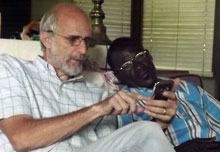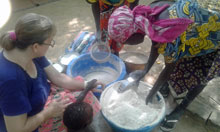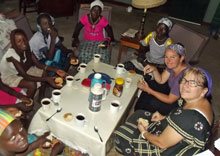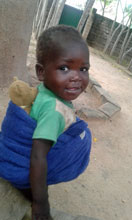
[Home] [Archived news updates and letters]
|
August 23, 2016
Dear
family, friends, and supporters; We are
in the midst of our favorite time of year – the rainy season – when
the barren landscape of Chad becomes like the garden of Eden. The Kwong
are engaged in the back-breaking labor of growing another year’s crops
– and are paradoxically happy as larks doing it. Unfortunately, it is
also the time of year when sickness and death from typhoid and malaria
are only too prevalent. Here, then, is two short vignettes into our
lives here in Africa. We think you will find them interesting. Your fellow
servants, Mark and Diane |
|
Getting
ready for the Kwong Bible School
It is
fair to say that all of Mark’s activities and much of Diane’s
activities are focused on preparing for the opening of the Kwong Bible
school next year. Our latest achievement is the researching, writing,
and translating of the missing volume 3 of our Kwong “Kingdom of
God” theology series. This booklet of 120 pages is entitled “The
Kingdom in Israel” and attempts to convey to the Kwong that Israel and
her laws are an essential part of God’s redemptive program and that
they are a lamp uniquely calibrated to illumine the beauty of the gospel
of Christ. Now that
book 3 is finished, we have begun translating an abridgement of “The
Reformed Pastor”, written by the Puritan Richard Baxter in 1656. This
book is (or was) a warm, passionate volume of instruction for his fellow
pastors around the town of Kidderminster in England. In it, he pleads
with them to but to be serious about their own spiritual health, and
serious about the spiritual health of each member of their flock –
messages the Kwong pastors need desperately to hear with all the fervor
Baxter brings to the matter. Besides
working long hours with François and Joseph to prepare these materials,
Mark and his Chadian tradesmen have finished pouring the floors of the
Bible school building and will soon begin work on the roof. All these
efforts, and others we haven’t mentioned, have made it clear to us
that we should not go the USA for our home assignment in 2017. Now it
appears we will stay in Chad another 2 years before returning to the
States. Making this decision was actually a tremendous relief. Quite
apart from the pressure of preparing for the opening of the Bible
school, as the years go by, our attachment to the USA becomes less, and
our attachments here become correspondingly greater. Kingdom
and Communion
One of
the joys of working on something like a Kwong theology over the course
of decades is seeing one’s own theology mature and take shape in new
ways. For many years, we have found the “Kingdom to God” to be a
useful framework on which to hang everything from the creation in
Genesis to the consummation in Revelation. This theme has the additional
benefit of being a motif that the Kwong can resonate with in a way that
they cannot with, for example, that perennial American favorite found
nowhere (but, yes, implied) in the Bible: “a personal
relationship with Jesus Christ.” But when
it came to weaving the Mosaic law into the theme of the Kingdom, it was
like fitting the proverbial square peg in a round hole. There was simply
no elegant way to combine this enormous wealth of teaching about the
sacrifices, the temple, and the feasts with what we had already
synthesized over the last 20 years under the rubric of the Kingdom. So
it was a rich personal epiphany for Mark to see that locked in the
conundrum before him was an entire second rubric of Biblical theology in
which hides the uniqueness of the Christian faith over against every
competitor: Communion. An infinite, other-worldly deity relentlessly
seeks the most improbable communion with mere mortals who have
figuratively (and literally) spit in his face. All the prescriptions of
the Mosaic law, far from being the onerous imposition they are often
portrayed as, were rather in large measure the gracious ground
rules to make this preposterous juxtaposition of incompatible
beings in some limited measure possible. God really wants
communion with man. And what a pleasure to see this theme worked out
beautifully through the whole of Scripture – beginning with the
tabernacle, and thence to the temple, and thence to the Incarnate Christ
“who tabernacled among us”, and thence to the indwelling of the
Third Person of the Trinitarian Godhead in mortal flesh, and finally to
the stupendous climax when, as it is written, “Now is the dwelling
of God with men, and he will live with them… and they will see his
face.” So now,
at least in English parlance (the Kwong is anything but pithy), our
theology is called “Kingdom and Communion,” Kingdom referring to
God’s intent to restore his rightful dominion (his God-ness) over all
things, and Communion referring to his intent to enjoy, well, communion
with mortal men and women. For the time being, at least until another
square peg gives us insight into another overarching theme of God’s
business in the universe and history, these two words sum up our
teaching of the gospel to the Kwong. And oh yes, come to think of it,
the bit about “communion” does sound suspiciously like a “personal
relationship.” |
Our
cell-phone internet service is slower than dialup used to be. But it
works. Checking out the satellite weather pictures (here with our radio
engineer David) to predict the weather has become a favorite pastime.
Keeping
a dozen or so malnourished babies fed keeps Diane and her helpers pretty
busy. Here they are mixing the enriched porridge mix which is the staple
food.
For
several weeks we have enjoyed giving a new Team missionary Annie Wilson
an orientation to life in rural Africa. Diane and Annie put together
several special discipleship lessons for the teenage girls of Chageen.
Our
surrogate daughter Sylvie whom we kept alive after her mother died
giving birth to her last year is now 19 months old. She is turning into
quite a precocious little darling. Like all Kwong women, life is just
not complete without a baby tied to her back. |



